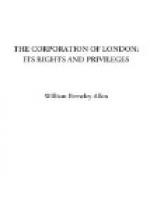The charter of William the Conqueror, the reader will have remarked, alludes in a very general manner to the liberties and privileges enjoyed by the City. The first detailed and specific notice of their character occurs in the charter of Henry I. In the early part of his reign, being anxious to fix himself securely in his seat, the usurper conveyed, or confirmed, a grant to the citizens to hold Middlesex to farm for the yearly rental of 300 pounds; to appoint their own sheriff and their own justiciar; to be exempt from various burdensome and vexatious taxes in force in other parts of the kingdom; to be free from all denominations of tolls, customs, passage, and lestage, throughout the kingdom and along the seaboard; and to possess many other equally important privileges. This valuable charter was renewed by King Stephen, during whose stormy and troubled reign the metropolis enjoyed a degree of prosperity unknown to the rest of the kingdom. The comparative peace and security which distinguished the happy lot of the citizens of London, have been justly attributed to the maintenance of their ancient institutions, which may be said to have grown out of the habits, requirements, thoughts, and feelings characteristic of the Anglo-Saxon race. Nor were the Londoners unconscious of their power, or ungrateful to their benefactor. It was chiefly through their influence and exertions that the empress was finally driven out of the kingdom, and Stephen established on the throne. Henry II. confirmed the purport of preceding charters, and added some further immunities, concluding with the declaration that their ancient customs and liberties were to be held as of inheritance from the king and his heirs. They became, therefore, the property of the citizens, and were bequeathed from father to son, as a cherished heirloom. It is true that under Richard I. they were exposed to some extortion, for which they received ample amends during the reign of his weak and inglorious successor. Not only did they obtain five different charters confirmatory of their ancient privileges, together with the restoration of the sheriffwick, usurped by the last three monarchs, but also the first formal recognition of the mayoralty. These favours, however, did not render them untrue




